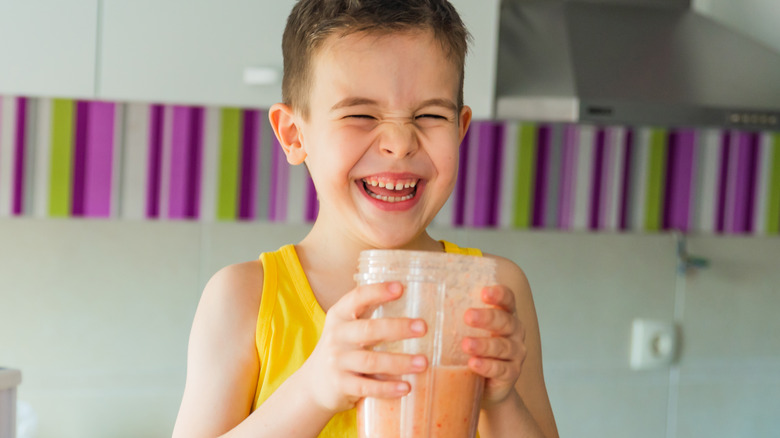Are Protein Shakes Safe For Children To Drink? What To Consider
Protein is essential for all of us, especially young children who are in the throes of different stages of development. The health of our skin, hair, blood, organs, muscles, and much more, all depend on protein. A lack of protein in a child's diet can increase their risk of fatigue, bone and joint pain, delayed growth, and lowered immunity, among other health concerns (per Abbott). However, this doesn't automatically mean that caregivers need to ramp up a child's protein intake with supplements.
Data shows that 1 in every 7 children between the ages of 6 and 13 are not getting enough protein — but what's considered enough? Generally speaking, kids ages 1 to 3 are recommended to get 13 grams of protein daily. For children between the ages of 4 and 8, 19 grams of protein each day is recommended. Older kids ages 9 to 13 should aim to consume 34 grams of protein daily.
Children who are underweight or highly selective in their food preferences may benefit from drinking protein shakes if approved by their pediatrician (per WebMD). However, if your child is already getting the protein that they need, giving them extra in the form of protein shakes can potentially be unsafe.
Excess protein may cause gastrointestinal problems
As previously mentioned, there are cases in which a child may not be getting sufficient amounts of protein in their daily diet. Oppositely, however, sports nutrition specialist and registered dietitian Diana Schnee told the Cleveland Clinic that many children are getting more than enough. "In most Western countries, children already get two to three times the protein they need daily," she stated. "It's uncommon for a child to need extra."
Even if a child is working their muscles every day playing sports, if they are eating a well-rounded diet, they are likely getting their protein needs met. Therefore, drinking protein shakes would add more protein than necessary, which can be hard for a child's body to break down. Whey protein powder is particularly popular and can potentially prompt digestive discomfort and diarrhea in children who are lactose intolerant (per WebMD). Children with lowered immunity may also be particularly susceptible to digestive issues related to increased protein intake. This is because certain ingredients, such as stimulants, are often found in protein powders. These ingredients can cause digestive discomfort but are not always listed on the label due to a lack of government regulation around supplements.
It can also increase children's risk for some health issues
Aside from an upset stomach, ingesting excess protein on a regular basis can also lead to weight gain in children and potential related health issues (per WebMD). In more serious cases, too much protein can impact a child's organ function, particularly the liver and kidneys. This can increase a child's risk of kidney stones and dehydration and may negatively affect the body's nutrient absorption process.
When it comes to protein intake, healthy children are often better served through diet than protein shakes. Incorporating seafood, lean meats, eggs, dairy products, beans, lentils, and other legumes into a child's diet can help ensure they're getting the protein that they need. On the other hand, if a child exhibits symptoms of decreased immunity, slowed growth, or hunger on a regular basis, talk to their doctor. A physician can help determine whether a child may be experiencing a protein deficiency.



